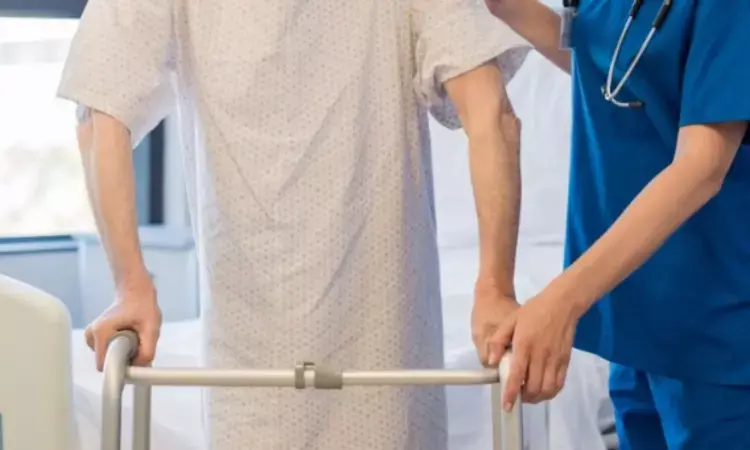- Home
- Medical news & Guidelines
- Anesthesiology
- Cardiology and CTVS
- Critical Care
- Dentistry
- Dermatology
- Diabetes and Endocrinology
- ENT
- Gastroenterology
- Medicine
- Nephrology
- Neurology
- Obstretics-Gynaecology
- Oncology
- Ophthalmology
- Orthopaedics
- Pediatrics-Neonatology
- Psychiatry
- Pulmonology
- Radiology
- Surgery
- Urology
- Laboratory Medicine
- Diet
- Nursing
- Paramedical
- Physiotherapy
- Health news
- Fact Check
- Bone Health Fact Check
- Brain Health Fact Check
- Cancer Related Fact Check
- Child Care Fact Check
- Dental and oral health fact check
- Diabetes and metabolic health fact check
- Diet and Nutrition Fact Check
- Eye and ENT Care Fact Check
- Fitness fact check
- Gut health fact check
- Heart health fact check
- Kidney health fact check
- Medical education fact check
- Men's health fact check
- Respiratory fact check
- Skin and hair care fact check
- Vaccine and Immunization fact check
- Women's health fact check
- AYUSH
- State News
- Andaman and Nicobar Islands
- Andhra Pradesh
- Arunachal Pradesh
- Assam
- Bihar
- Chandigarh
- Chattisgarh
- Dadra and Nagar Haveli
- Daman and Diu
- Delhi
- Goa
- Gujarat
- Haryana
- Himachal Pradesh
- Jammu & Kashmir
- Jharkhand
- Karnataka
- Kerala
- Ladakh
- Lakshadweep
- Madhya Pradesh
- Maharashtra
- Manipur
- Meghalaya
- Mizoram
- Nagaland
- Odisha
- Puducherry
- Punjab
- Rajasthan
- Sikkim
- Tamil Nadu
- Telangana
- Tripura
- Uttar Pradesh
- Uttrakhand
- West Bengal
- Medical Education
- Industry
Study Reveals High Rates of Orthostatic Intolerance in Lung Cancer Surgery Patients, Suggests Focus on Pain Management

China: A recent prospective observational study has revealed a significant prevalence of orthostatic intolerance (OI) in patients recovering from thoracoscopic lung cancer resection. This condition, characterized by dizziness or fainting upon standing, hindered patients' ability to mobilize effectively and extended their hospital stays, highlighting an important challenge in postoperative care.
The study, published in BMC Surgery, further revealed that being female and experiencing high levels of pain while sitting were identified as independent risk factors for orthostatic intolerance.
"This indicates that special attention should be directed towards these at-risk patients. By optimizing pain management for these groups, we may reduce the likelihood of developing orthostatic intolerance, promoting early mobilization and enhancing postoperative rehabilitation," the researchers wrote.
Thoracoscopic lung resection is a minimally invasive surgical technique often employed in lung cancer treatment. Early postoperative mobilization is crucial for improving recovery, but it can be impeded by orthostatic intolerance. However, research on this condition following thoracoscopic lung resection is limited. To fill this knowledge gap, Wenfeng Tang, Department of Nursing, The First Affiliated Hospital of Chongqing Medical University, Chongqing, China, and colleagues aimed to investigate the prevalence and variables contributing to orthostatic intolerance on the first day following thoracoscopic lung cancer resection.
For this purpose, the researchers carried out a prospective observational study from February 1 to May 5, 2023, at the First Affiliated Hospital of Chongqing Medical University. The study enrolled 215 patients who underwent thoracoscopic lung resection. Researchers collected data on their general demographics, disease characteristics, treatment details, and instances of orthostatic intolerance.
The study led to the following findings:
- 29.77% of patients demonstrated orthostatic intolerance during early mobilization, and 43.75% failed to walk.
- The prevalence of nausea, dizziness, and impaired vision was 60.94%, 92.19%, and 25.00%, respectively, and no patient experienced syncope.
- The factors shown to be independently linked with orthostatic intolerance were being female (OR = 2.98) and high pain level during sitting (OR = 2.69).
- Individuals with orthostatic intolerance had a longer postoperative hospital stay with a mean of 5.42 days against 4.25 days.
In conclusion, orthostatic intolerance was frequently observed during early mobilization after thoracoscopic lung cancer resection. Common symptoms included dizziness, nausea, and impaired vision, which hindered patients' ability to mobilize and extended their postoperative hospitalization. The study identified two independent risk factors for OI: female sex and elevated pain levels while sitting.
This study faced several limitations, including the inability to schedule mobilization evaluations consistently for all participants. While postoperative OI typically improves over time, our analysis found no significant differences between OI and control groups. Also, the researchers did not assess postoperative inflammation or quantify perioperative intravenous fluid, which may affect OI.
Reference:
Yi, H., Tang, W., Shen, Y. et al. Orthostatic intolerance during early mobilization following thoracoscopic lung resection: a prospective observational study. BMC Surg 24, 265 (2024). https://doi.org/10.1186/s12893-024-02556-3
Dr Kamal Kant Kohli-MBBS, DTCD- a chest specialist with more than 30 years of practice and a flair for writing clinical articles, Dr Kamal Kant Kohli joined Medical Dialogues as a Chief Editor of Medical News. Besides writing articles, as an editor, he proofreads and verifies all the medical content published on Medical Dialogues including those coming from journals, studies,medical conferences,guidelines etc. Email: drkohli@medicaldialogues.in. Contact no. 011-43720751


